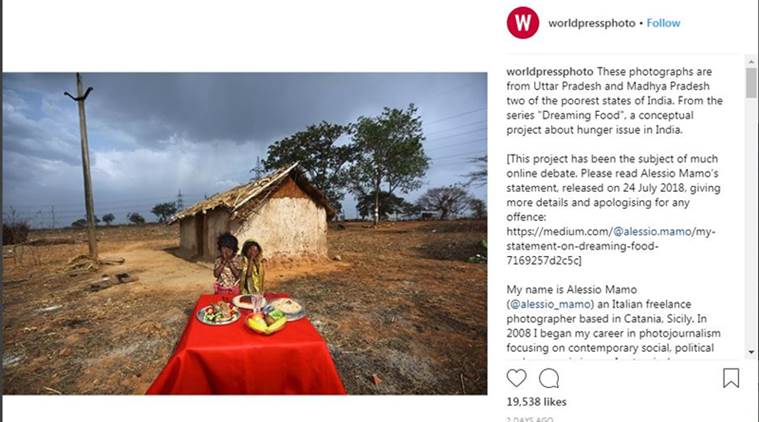Cause and Effect
A photo series depicting poverty in India has sparked outrage on social media.

WPP has been pulled up on social media for “promoting the series.”
A photo series intended to highlight “extreme poverty and disease” in India has invited severe outrage on social media. Shared by Italian photographer Alessio Mamo on the Instagram handle of World Press Photo (WPP), the photographs were taken in Uttar Pradesh and Madhya Pradesh, described by Mamo as “two of the poorest states of India”. Titled “Dreaming Food”, the series conceived in 2011 has visibly poor subjects standing with their faces covered in front of tables full of food. The caption reads: “The idea of this project was born after reading the statistics of how much food is thrown away in the West, especially during Christmas time. I brought with me a table and some fake food, and I told people to dream about some food that they would like to find on their table.”
Responding to the criticism, Mamo said in a statement, “The people I photographed were living in a village and they were not suffering from malnutrition anymore, they were not hungry or sick, and they freely participated in the project… I want to offer my deepest apologies to anyone who felt offended and hurt by this photos, and to the people I photographed.”
Awarded second prize in “People, Singles” category at the 2018 WPP Photo Contest for his portrait of Manal (11), a victim of a missile explosion in Kirkuk, Iraq, Mamo was given the opportunity to temporarily take over WPP’s Instagram account as part of the award. An official statement by WPP on the issue says: “The photographers are responsible for selecting their work to show and writing their captions… Other than his portrait of Manal, none of the photographs Alessio has shared were awarded prizes in the photo contest.”
Meanwhile, WPP has been pulled up on social media for “promoting the series”, but most comments are targeted towards the photographer. The series had also invited criticism when it was showcased at the 2013 Delhi Photo Festival. Prashant Panjiar, its co-founder, recalls, “We showed the work as an example of Staged Conceptual Photography that looked into the inequities of consumption. Our team was divided on the choice of this work, and some viewers were also offended by it.”
In the past, similar photo shoots have been condemned for being insensitive. In 2014, Mumbai-based photographer Raj Shetye’s photograph of a model fighting men in a bus was criticised for trivialising the 2012 rape case that shocked India.
For all the latest Lifestyle News, download Indian Express App






















No hay comentarios:
Publicar un comentario